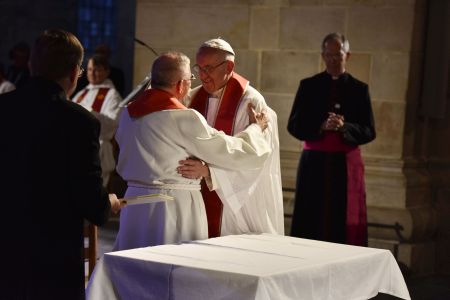 To launch the year of events celebrating the 500th anniversary of the Reformation in 2017, the Lutheran World Federation (represented by its President Bishop Munib Younan and its General Secretary Martin Junge) and the Pontifical Council for Promoting Christian Unity (represented by Pope Francis and Cardinal Kurt Koch) held a joint commemoration of the Reformation at Lund Cathedral and the Malmö Arena in Sweden on 31 October 2016. I was invited to represent the Union of Utrecht at the event.
To launch the year of events celebrating the 500th anniversary of the Reformation in 2017, the Lutheran World Federation (represented by its President Bishop Munib Younan and its General Secretary Martin Junge) and the Pontifical Council for Promoting Christian Unity (represented by Pope Francis and Cardinal Kurt Koch) held a joint commemoration of the Reformation at Lund Cathedral and the Malmö Arena in Sweden on 31 October 2016. I was invited to represent the Union of Utrecht at the event.
Celebration or commemoration?
So what is there to celebrate? After all, say some, the Reformation split the Church. But, say others, there were divisions even before the Reformation. Almost every division in the Church stems from a struggle to find the truth. That is how, after the introduction of the dogma of papal infallibility and the doctrine of papal supremacy, we Old Catholics separated from the Roman Catholic Church.
It was Martin Luther who called on people to turn their attention solely to Christ (grace and the doctrine of justification) and to read and act independently in accordance with the Holy Scriptures. The resulting theological differences concerning ministry, the church and the Eucharist/Holy Communion can today probably be resolved. Through the Council of Trent, the Roman Catholic Church also took up and put into practice many of the concerns of the Reformation. In that sense, the Reformation resulted in many positive changes. The Lutheran–Roman-Catholic dialogue appears to be making very good progress at the global level. However, the Lutherans are currently focusing primarily on a model of reconciled diversity and practical cooperation without structural consequences. The questions of how the Church should be led and how it can best reveal the will of God and the Holy Spirit have been answered in different ways throughout history. The Lutheran World Federation hopes that the Roman Catholic Church will extend Eucharistic hospitality to couples in interdenominational marriages.
 Why Lund rather than Wittenberg?
Why Lund rather than Wittenberg?
Like other church alliances and denominations, the Lutheran World Federation is today a global organisation whose reach extends far beyond the German-speaking countries or the borders of Europe. Its President was born in Jerusalem; its General Secretary comes from South America. The Lutheran World Federation therefore opened its year of commemoration in Lund, where it was established 70 years ago, and will be holding its next general assembly in Windhoek, Namibia, in 2017. Inviting the Pope to Wittenberg would have reduced this worldwide outlook. Holding the commemoration in Lund was also a concession to the Roman Catholic Church, which prefers to focus on factual issues rather than the figure of Luther himself. In today’s world, Lutheranism has many faces and theological schools of thought in many cultures.
How can we serve the Gospel and the world together?
The sermon by General Secretary Dr. Martin Junge, the address by President Bishop Munib Younan, the sermon and address by Pope Francis and the joint declaration signed in Lund all point to a common message: The Lutheran World Federation and the Roman Catholic Church acknowledge that grave mistakes and misunderstandings have occurred on both sides in the past, and they ask God for forgiveness. There is a desire for reconciliation and unity, but in the current stage of dialogue this cannot extend past an increase of practical cooperation. The two Churches want to work more closely together for the care of creation and the care of refugees, and against every kind of violence, oppression, discrimination and exploitation. Much has already been achieved, and the journey continues.
We must remember, however, that there is actually no such thing as the “Reformation Churches”. There are considerable differences, especially between the Lutheran and the Reformed Churches – not to mention the Anglican, Methodist, and many other traditions. The Lutheran Church of Sweden and the Old Catholic Church of Switzerland, for example, are much closer to each other than the Federation of Swiss Protestant Churches and the United Evangelical Lutheran Church of Germany. That is why a differentiated approach is required, also for the Roman Catholic Church. It remains to be seen how relations will develop in the future. In Lund, in any case, the spirit of optimism was palpable.
differences, especially between the Lutheran and the Reformed Churches – not to mention the Anglican, Methodist, and many other traditions. The Lutheran Church of Sweden and the Old Catholic Church of Switzerland, for example, are much closer to each other than the Federation of Swiss Protestant Churches and the United Evangelical Lutheran Church of Germany. That is why a differentiated approach is required, also for the Roman Catholic Church. It remains to be seen how relations will develop in the future. In Lund, in any case, the spirit of optimism was palpable.
Bishop Dr. Harald Rein, Secretary of the International Bishops’ Conference
1 November 2016
President of the Lutheran Worldfederation, Bishop Munib Younan und Pope Francis; photo: Marie Renaux/LWB
Lund Cathedral, Commemoration Service; Photo: Mikael Ringlander
Bishops Jorge Pino Cabral (Lusitanian Church of Portugal), Harald Rein (Old Catholic Church of Switzerland), Carlos Lopez-Lozano (Spanish Reformed Episcopalchurch); Photo: Bishop Harald Rein

